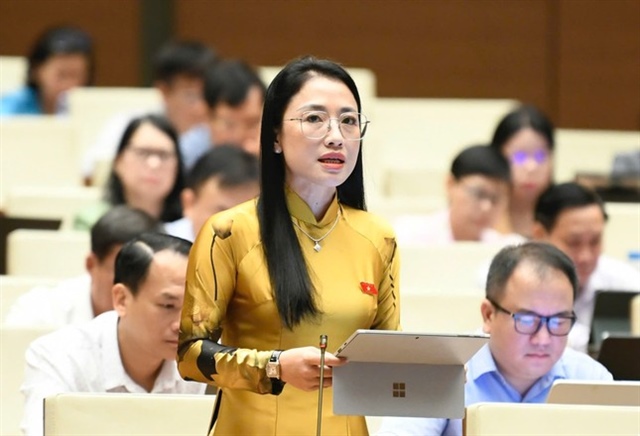Continuing the session, on the morning of May 10, the National Assembly discussed the draft Law amending and supplementing a number of articles of the Law on Advertising.
National Assembly Deputy Tran Khanh Thu (Thai Binh delegation) stated that the recent cases of fake milk and dietary supplement scandals revealed that the involved companies had all the necessary inspection and testing documents, as well as product registration papers.
However, in reality, the products that were manufactured and investigated by the public security agency were found to be counterfeit.

National Assembly Deputy Tran Khanh Thu (Thai Binh delegation). Photo: Nhu Y |
“Is it really feasible to require advertisers, especially singers, artists, actors, and KOLs, to verify documents related to the product or goods?” asked Ms. Tran Khanh Thu.
The deputy cited the management experience of some countries, such as the United States, where celebrities must clearly disclose their financial relationships with brands when advertising products. Advertisements must be truthful and not misleading about the effectiveness or features of the product.
In South Korea, disguised advertising on social media is prohibited. Violators can be fined up to 2% of advertising revenue or up to 500 million won (approximately 8.7 billion VND). In 2022, the country required the addition of a provision prohibiting artists from being brand ambassadors for liquor companies to reduce negative influences on young people.
Sharing the same concern, Deputy Trinh Xuan An (Dong Nai delegation) stated that, in reality, influential people or those who attract attention are often chosen to advertise products. These individuals are usually singers, actors, models, or those who create scandals.
“Influencers have a large number of followers and will do whatever it takes to increase their following. We need to tighten the regulations on advertising by influencers. An actress or beauty queen who knows nothing about a product still advertises it just because of their beauty,” said Mr. An. He suggested that only those with relevant qualifications and expertise should be allowed to advertise.
Online environment prone to abuse
Also at the discussion, delegates pointed out that the online environment, including the Internet, social media, and cross-border platforms, is gradually replacing traditional advertising methods.
However, this environment is prone to abuse for disseminating misleading information and promoting low-quality products, such as dietary supplements, drugs of unknown origin, and disguised gambling services.
Therefore, the delegates proposed controlling the content of advertisements in the online environment as a separate issue to emphasize its urgency.
According to Deputy Nguyen Tran Phuong Tran (Ho Chi Minh City delegation), it is necessary to specify the procedures and responsibilities of related parties regarding online advertising business and services. There should be a requirement for advertisers to provide business licenses or valid legal documents. The advertising platform must take responsibility for storing and providing information when requested by competent authorities.
“Online advertising platforms must have a control mechanism and an automatic reporting system for advertisements appearing next to illegal content. This will help people distinguish high-quality goods,” emphasized the deputy.
Luân Dũng
– 11:22 10/05/2025

















